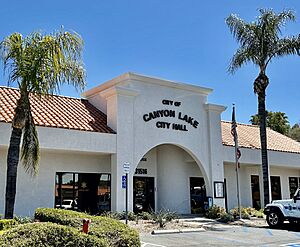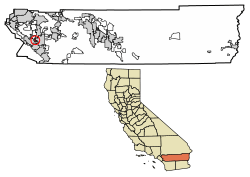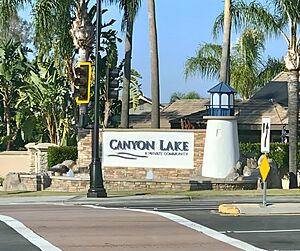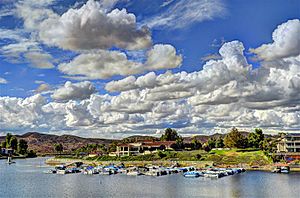Canyon Lake, California facts for kids
Quick facts for kids
Canyon Lake
|
|
|---|---|
| City of Canyon Lake | |

Canyon Lake City Hall
|
|

Location in Riverside County and the state of California
|
|
| Country | United States |
| State | California |
| County | |
| Incorporated | December 1, 1990 |
| Government | |
| • Type | Council-Manager |
| Area | |
| • Total | 4.66 sq mi (12.07 km2) |
| • Land | 3.92 sq mi (10.15 km2) |
| • Water | 0.74 sq mi (1.92 km2) 15.92% |
| Elevation | 1,384 ft (422 m) |
| Population
(2020)
|
|
| • Total | 11,082 |
| • Estimate
(2022)
|
11,142 |
| • Density | 2,827.76/sq mi (1,091.82/km2) |
| Time zone | UTC-8 (Pacific) |
| • Summer (DST) | UTC-7 (PDT) |
| ZIP code |
92587
|
| Area code | 951 |
| FIPS code | 06-10928 |
| GNIS feature IDs | 1668254, 2409979 |
Canyon Lake is a city and a special kind of neighborhood called a gated community in Riverside County, California. It's built around a beautiful lake called Canyon Lake reservoir. This city was planned out in 1968 and officially became a city on December 1, 1990. The lake itself was formed in 1927 when the Railroad Canyon Dam was built across the San Jacinto River. The lake covers about 383 acres and has nearly 15 miles of shoreline, making it a great spot for water activities!
Contents
History of Canyon Lake
How Canyon Lake Got Its Name
The city of Canyon Lake is named after the large lake it surrounds. At first, the lake was called Railroad Canyon Reservoir or Railroad Canyon Lake. But over time, people started using the shorter name, Canyon Lake, for both the lake and the community.
Building the Lake and Early Days
Back in 1882, a railroad line was built near the San Jacinto River. However, floods in 1884, 1916, and 1927 kept washing out the tracks. After the last big flood, the railroad company decided to stop using that line.
Soon after, a company called Temescal Water Company bought the land where the railroad used to be. They also bought more land from local ranchers. In 1927, they started building a dam across the river to collect water. This dam was finished in 1929.
The new lake, called Railroad Canyon Reservoir, became one of the biggest freshwater lakes in Southern California. It was a popular place for fishing, hunting, and camping. Families managed the resort area around the lake for many years.
How the Community Grew
In 1968, the Corona Land Development Company started planning a new community around the lake. They designed Canyon Lake as a large, organized neighborhood with 4,801 building lots. This planned community eventually grew into the city we know today.
Geography of Canyon Lake
Where is Canyon Lake?
Canyon Lake is located in Southern California. It sits east of the city of Lake Elsinore and west of Menifee. The city is nestled in the southern hills of the Temescal Mountains.
Size of the City
The city of Canyon Lake covers about 4.7 square miles. Most of this area, about 3.9 square miles, is land. The remaining 0.7 square miles is water, which is the lake itself. The lake has a shoreline that stretches for about 14.9 miles.
The Canyon Lake Reservoir
The community is named after the Canyon Lake reservoir. This lake is also known as the Railroad Canyon Reservoir. It was created in 1928 when the Railroad Canyon Dam was built.
The reservoir covers about 525 acres and has 14.9 miles of shoreline. It holds a lot of water, about 11,586 acre-feet. The Elsinore Valley Municipal Water District owns and manages the lake.
The lake gets its water from stormwater runoff from the San Jacinto River and Salt Creek. Water from the reservoir is used at the Canyon Lake Water Treatment Plant. This plant provides about 10% of the drinking water for the Lake Elsinore and Canyon Lake areas.
People of Canyon Lake
Who Lives in Canyon Lake?
According to the 2020 Census, Canyon Lake had a population of 11,082 people. The city has seen some changes in its population over the years.
Historically, most residents in Canyon Lake were non-Hispanic white. However, in recent years, more people from Hispanic, African American, and Asian backgrounds have moved to the city.
In 2020, about 74.7% of the population was non-Hispanic white. This is still higher than the average for California and the entire United States.
Age and Income
In 2020, about 21.8% of the people in Canyon Lake were under 18 years old. About 17.6% of the population was 65 years old or older.
The average income for a household in Canyon Lake was about $120,118 in 2020. About 6.4% of the residents lived below the poverty line.
City Services and Transportation
Schools in Canyon Lake
There are no public schools located directly inside Canyon Lake. Students who live in the city attend schools that are part of the Lake Elsinore Unified School District (LEUSD).
Public Library
The Riverside County Library System (RCLS) has a library branch in Canyon Lake. This library used to be inside the city hall. In August 2021, the Canyon Lake Library moved to a bigger, separate building.
Security and Safety
Canyon Lake is a gated community, which means there are gates that control who can enter. These gates are staffed 24 hours a day by a community patrol. Visitors usually need to be sponsored by a property owner or renter to get in.
Since Canyon Lake became a city in 1990, it has its own police department. This department works through a contract with the Riverside County Sheriff's Department. The city also has its own private security services.
There are also special officers who patrol the land along the eastern shore of the lake. This area is popular for hikers and birdwatchers. Canyon Lake has a rule that forbids motorcycles and dirt bikes on its private streets. However, they are allowed on the two public roads, Railroad Canyon and Goetz Roads.
Getting Around
Canyon Lake is located about 3 miles east of Interstate 15 and 5 miles west of Interstate 215.
- Railroad Canyon Road is the main public road in Canyon Lake. It connects the city to nearby Lake Elsinore and Menifee.
- Goetz Road connects the eastern part of Canyon Lake to the community of Quail Valley and the city of Perris.
See also
 In Spanish: Canyon Lake (California) para niños
In Spanish: Canyon Lake (California) para niños




